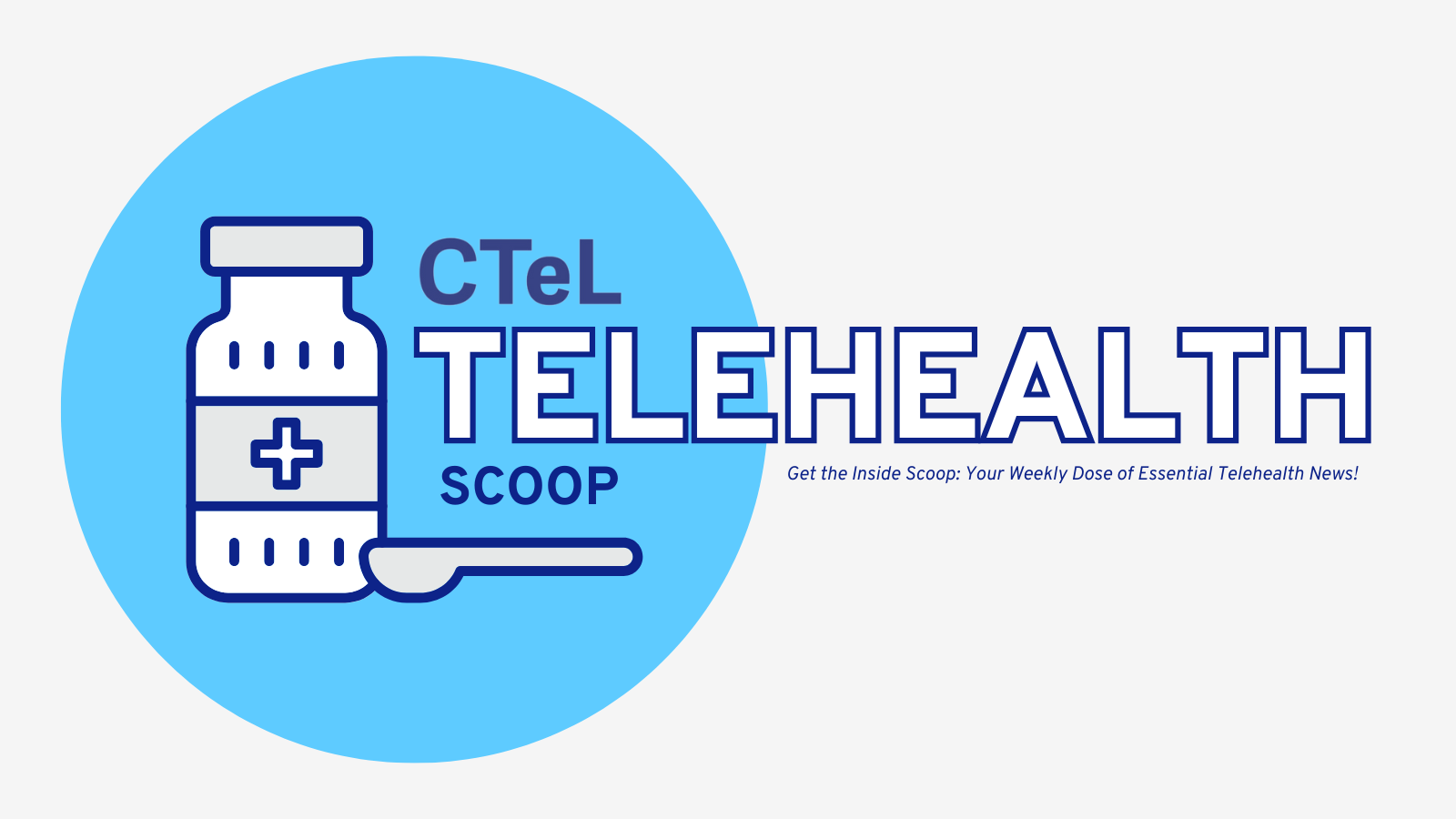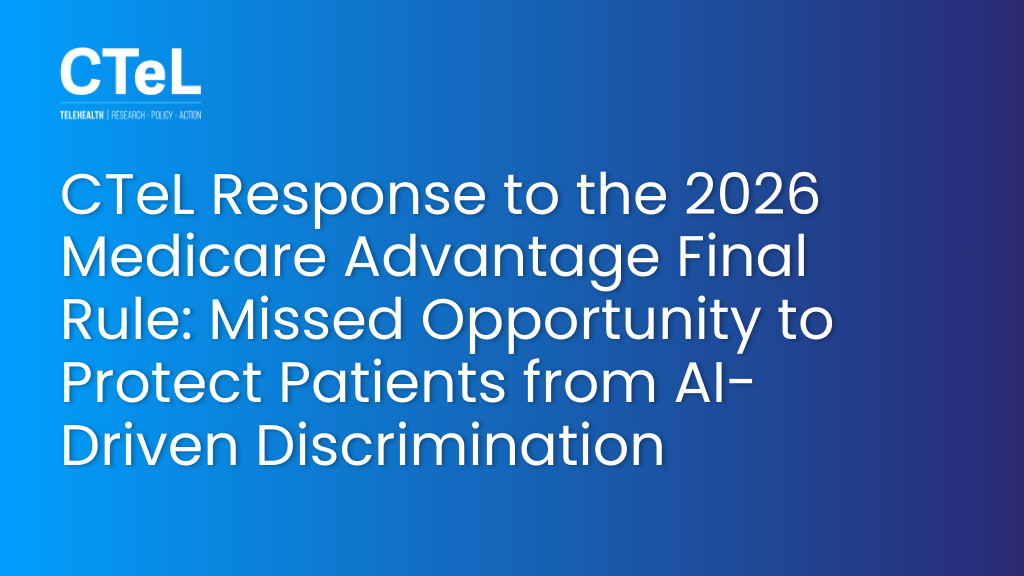
CTeL Response to the 2026 Medicare Advantage Final Rule: Missed Opportunity to Protect Patients from AI-Driven Discrimination
The Center for Telehealth & e-Health Law (CTeL) expresses deep concern over the Centers for Medicare & Medicaid Services’ (CMS) omission of key language in its finalized Contract Year 2026 Policy and Technical Changes to the Medicare Advantage (MA) Program rule—specifically, language clarifying the applicability of anti-discrimination law to the use of artificial intelligence (AI) in MA plan administration.
In an era when AI is rapidly transforming healthcare delivery, the failure to explicitly state that civil rights laws apply to algorithmic decision-making in federally funded health programs like Medicare Advantage is a critical oversight. CTeL views this as a missed opportunity to reinforce patient protections and promote equity in the use of emerging technologies.
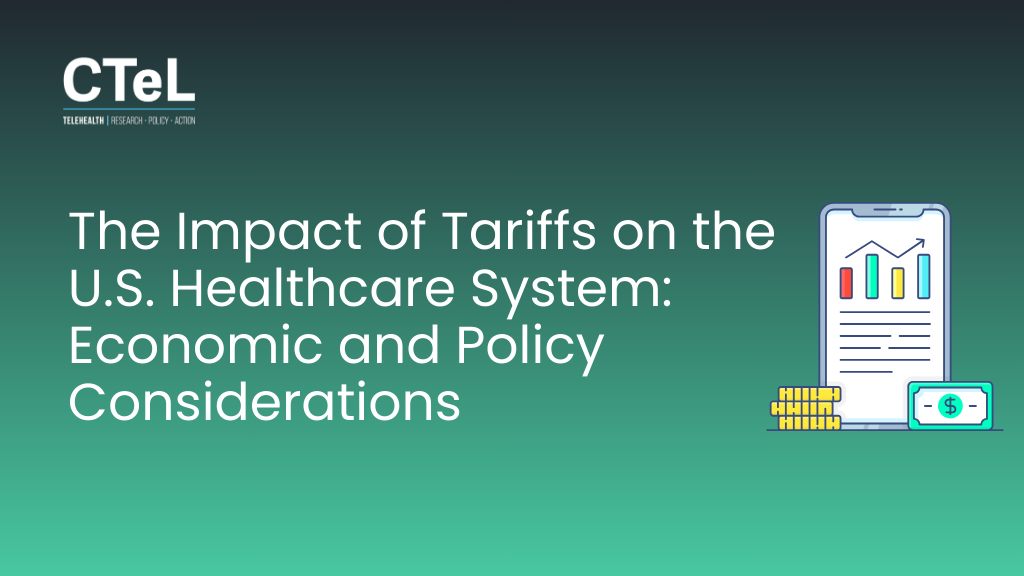
The Impact of Tariffs on the U.S. Healthcare System: Economic and Policy Considerations
The recent implementation of tariffs by President Donald Trump has introduced significant challenges for the U.S. healthcare system, particularly affecting hospitals and health systems. These tariffs include a baseline 10% levy on all foreign imports, with higher reciprocal tariffs on specific countries, such as 54% on China and 20% on the European Union (The Times, 2025). While these measures are designed to bolster domestic manufacturing and reduce trade deficits, they pose substantial risks to healthcare supply chains, escalate costs, and potentially compromise patient care. Understanding these ramifications is critical, as the economic burden could extend beyond hospitals to affect the broader public through increased healthcare costs and potential reductions in service quality.

HHS Restructuring: Key Changes Impacting Hospitals, Health Systems, and Telehealth Providers
The U.S. Department of Health and Human Services (HHS) has announced a major restructuring aimed at streamlining operations, improving coordination, and enhancing efficiency in delivering healthcare services. These changes will have significant implications for hospitals, health systems, and direct-to-consumer (DTC) telehealth providers. Below is an overview of the restructuring and what healthcare stakeholders need to know.

Analyzing the AHA & Health-ISAC Cybersecurity Threat Warning: Expert Insights & Next Steps for Hospitals
The American Hospital Association (AHA) and Health-ISAC recently issued a joint threat bulletin warning of a potential coordinated, multi-city terrorist attack targeting hospitals. While the credibility of the threat remains unverified, the bulletin emphasizes the urgent need for hospitals to reassess cybersecurity, physical security, and emergency response plans.
To provide a deeper understanding, we analyze this warning through the lens of digital health, cybersecurity, HIPAA compliance, patient rights, and healthcare infrastructure. Here’s what most healthcare leaders overlook—and how they should respond.

CTeL Advocates for Expanded Remote Monitoring Access to Strengthen Post-Acute Care
The Center for Telehealth and e-Health Law (CTeL) continues its advocacy for expanding remote monitoring capabilities in post-acute care, emphasizing the need for Medicare reimbursement policies that reflect real-world clinical applications. In a recent comment letter to the House Ways & Means Subcommittee on Health, CTeL underscored the value of Remote Physiological Monitoring (RPM) and Remote Therapeutic Monitoring (RTM) in reducing hospital readmissions and improving patient outcomes.
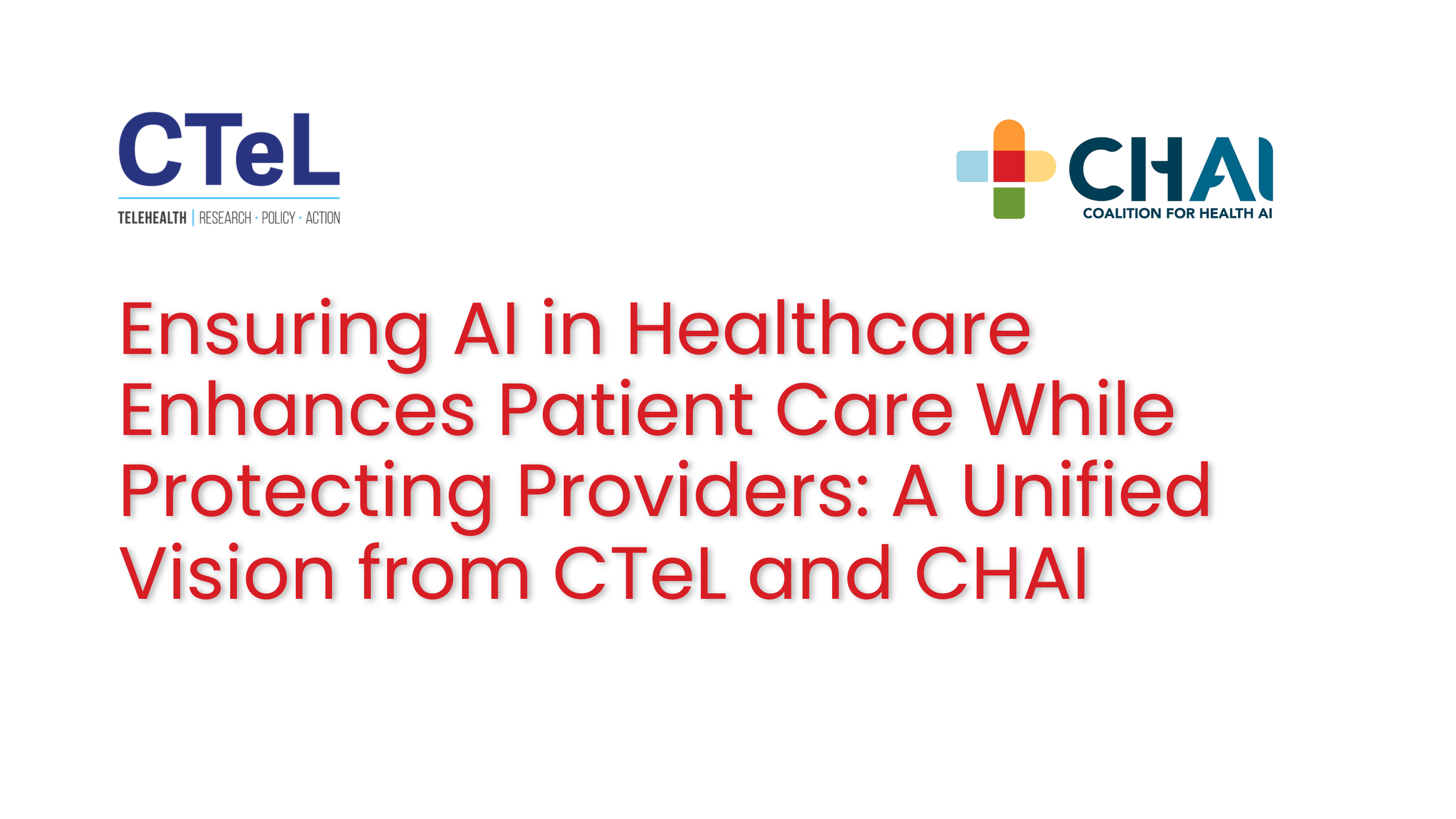
Ensuring AI in Healthcare Enhances Patient Care While Protecting Providers: A Unified Vision from CTeL and CHAI
Artificial Intelligence (AI) is no longer a distant concept for the future—it is here, actively reshaping healthcare as we know it. From streamlining administrative burdens to enhancing clinical decision-making, AI is poised to be the most transformative force in modern medicine. However, the rapid evolution of AI demands structured, responsible implementation to ensure it serves its ultimate purpose: improving patient outcomes while safeguarding providers and health systems.
Two organizations at the forefront of this mission—the Center for Telehealth and e-Health Law (CTeL) and the Coalition for Health AI (CHAI)—have been working to bridge the gap between AI’s potential and its responsible deployment. Their insights into AI governance, transparency, workforce training, and liability protections form a crucial roadmap for policymakers, health systems, and digital health innovators navigating this evolving landscape.
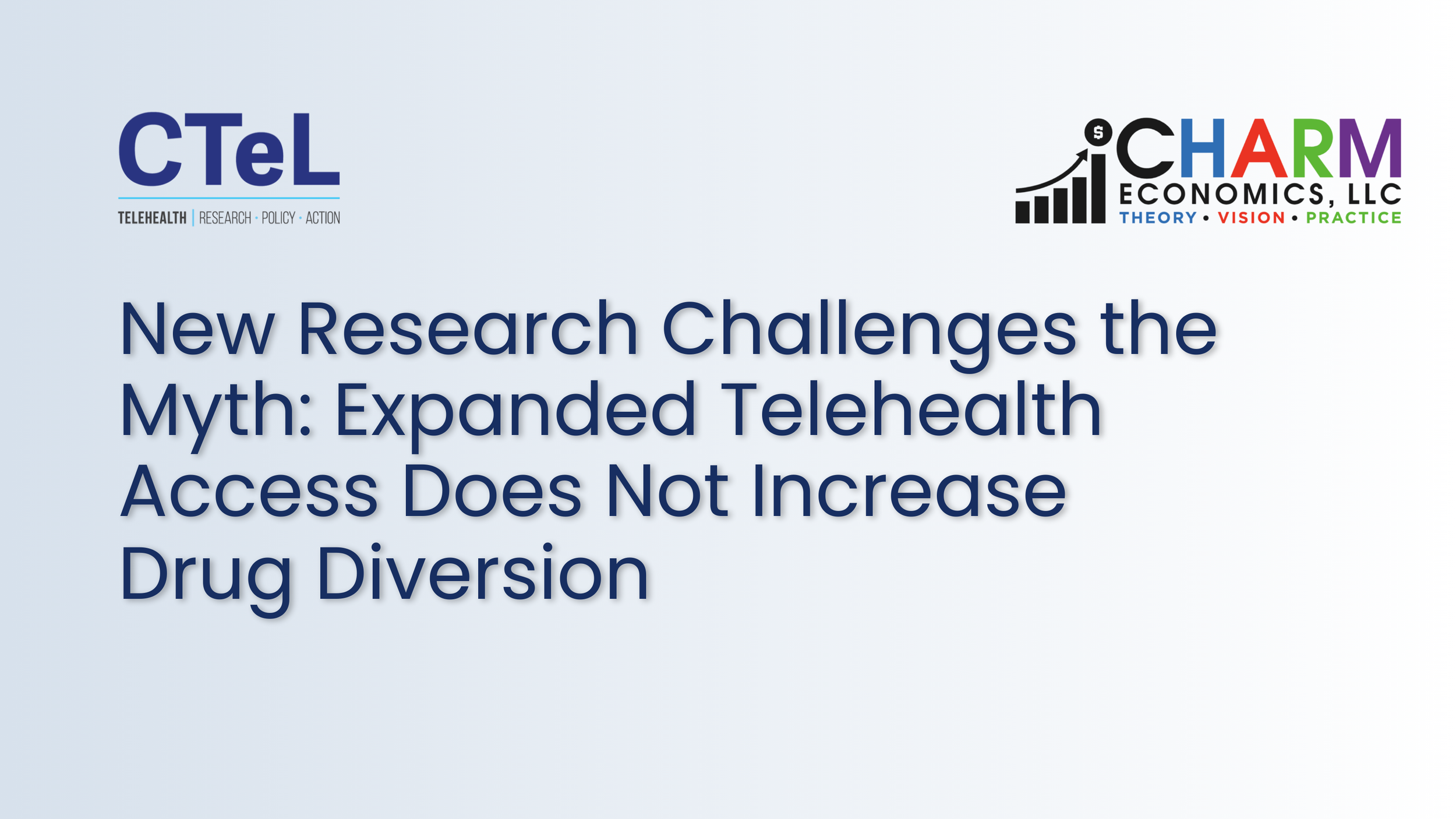
New Research Challenges the Myth: Expanded Telehealth Access Does Not Increase Drug Diversion
As the Drug Enforcement Administration (DEA) approaches a critical decision on telehealth prescribing waivers at the end of 2025, groundbreaking research sponsored by the Center for Telehealth & e-Health Law (CTeL) in collaboration with Charm Economics provides compelling evidence that expanded telehealth access does not contribute to increased drug diversion. Contrary to long-standing concerns, this study indicates that telehealth expansion—supported through payment parity laws—may actually reduce overdose rates by improving access to treatment for opioid use disorder (OUD) and other substance use disorders (SUDs).
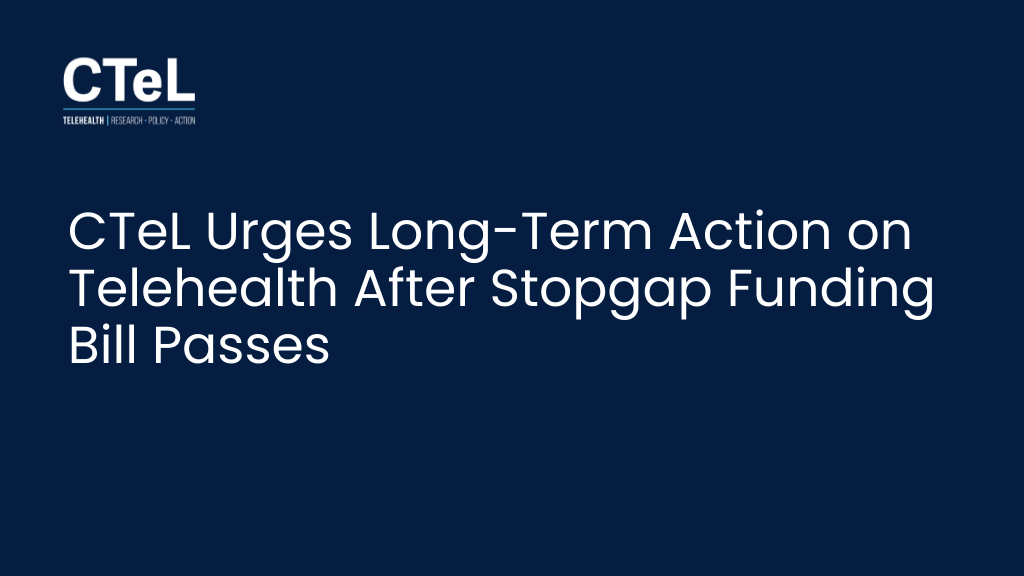
CTeL Urges Long-Term Action on Telehealth After Stopgap Funding Bill Passes
We commend Congress for extending telehealth flexibilities in the recent Continuing Resolution (CR), a crucial step in maintaining patient access and care continuity. Allowing these waivers to expire could significantly disrupt healthcare services, particularly for Medicare beneficiaries. Notably, during the COVID-19 pandemic, telehealth usage among Medicare beneficiaries surged from 1% in 2019 to 44% in 2020, highlighting its critical role in healthcare delivery (Bipartisan Policy Center, 2022).
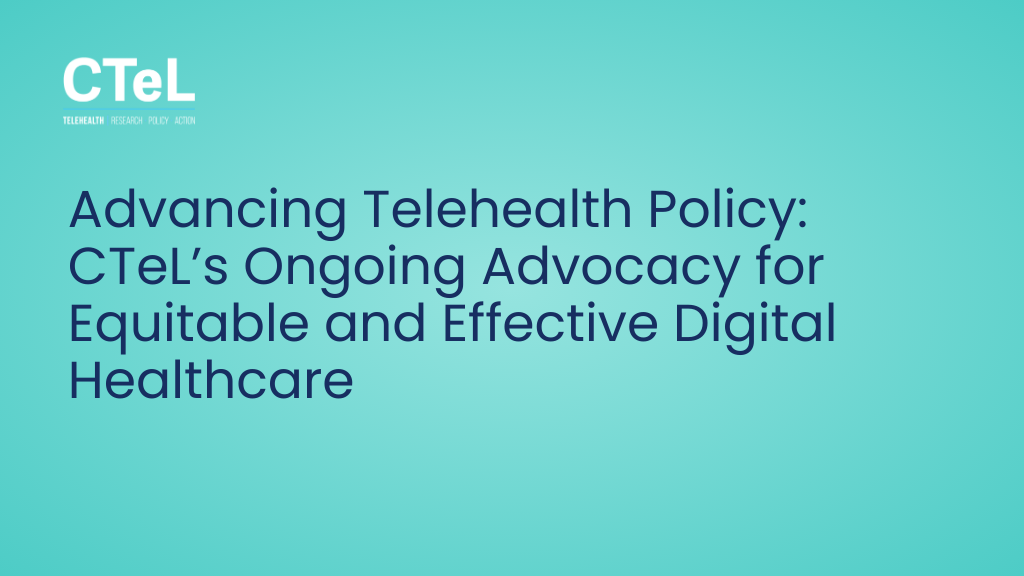
Advancing Telehealth Policy: CTeL’s Ongoing Advocacy for Equitable and Effective Digital Healthcare
The Center for Telehealth and e-Health Law (CTeL) continues to be a leading voice in shaping policies that impact digital health, telemedicine, and artificial intelligence in healthcare. Through our collaborative efforts, we have provided comprehensive responses to key regulatory proposals, ensuring that the interests of patients, providers, and healthcare innovators are well-represented. Our recent comment letters on the Drug Enforcement Administration’s (DEA) Special Registration Rule and the Administration’s AI Action Plan highlight the critical role CTeL plays in advancing legislation that supports the future of digital healthcare.
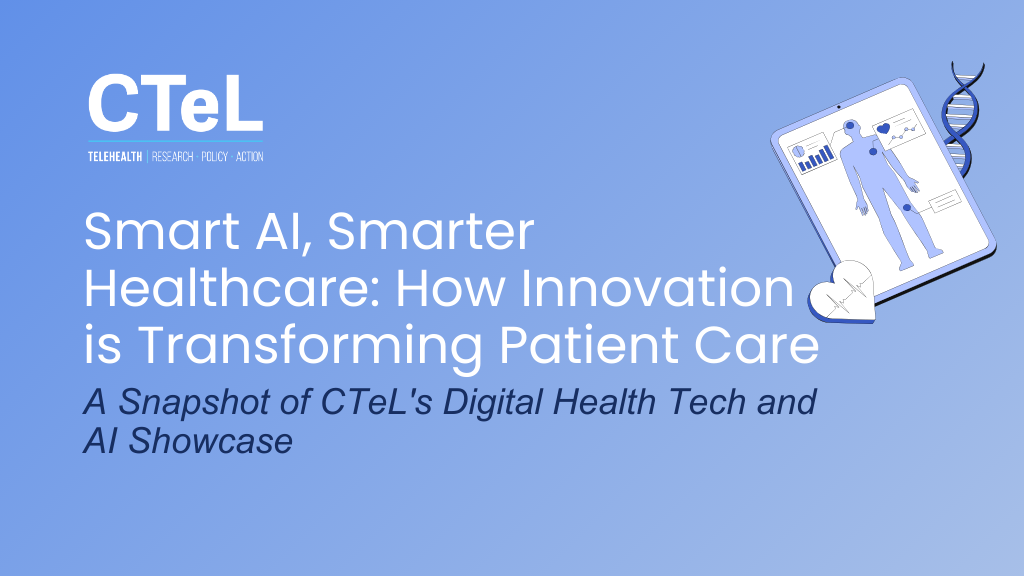
Smart AI, Smarter Healthcare: How Innovation is Transforming Patient Care
On March 12, the Center for Telehealth and e-Health Law (CTeL) brought the future of healthcare straight to Capitol Hill. Nearly 30 vendors participated in CTeL’s Digital Health Tech and AI Showcase, presenting groundbreaking innovations to congressional staffers and emphasizing the urgent need for regulatory support to advance digital health and artificial intelligence (AI) in medicine. The event also honored key figures driving change, including Congresswoman Doris Matsui and Dr. Andrew Taylor, highlighting the growing support for responsible AI in healthcare.
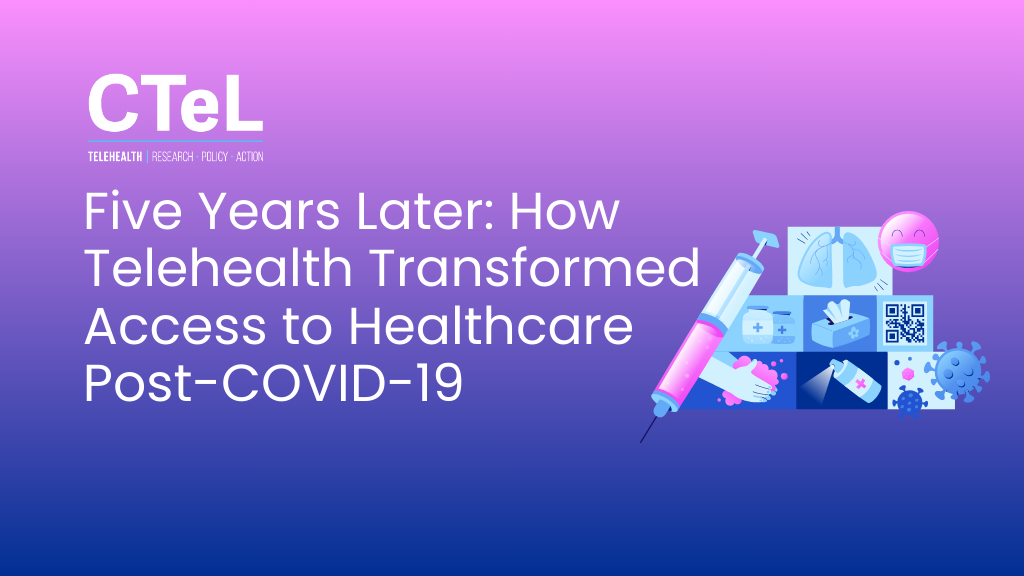
Five Years Later: How Telehealth Transformed Access to Healthcare Post-COVID-19
March 11, 2025 marks the five-year anniversary of the declaration of the COVID-19 pandemic. The COVID-19 pandemic, declared by the World Health Organization in March 2020, radically reshaped the healthcare landscape, accelerating the adoption of telehealth and digital health services. As we mark the five-year anniversary of the pandemic's declaration, it is critical to reflect on how telehealth has evolved, how policy and legislation have supported its growth, and the instrumental role that CTeL has played in shaping telehealth policy and guidance.=
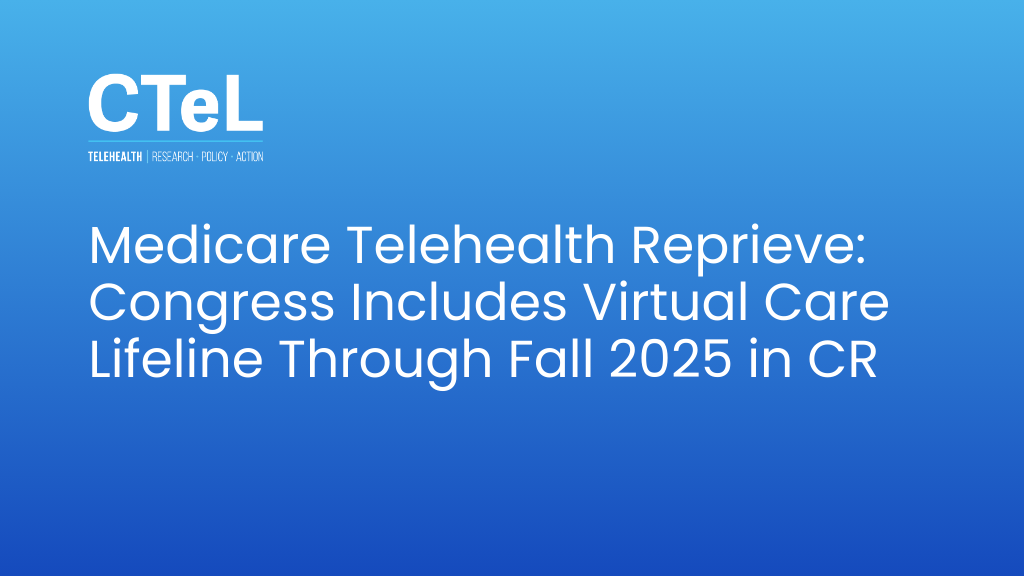
Medicare Telehealth Reprieve: Congress Includes Virtual Care Lifeline Through Fall 2025 in CR
The March 2025 Continuing Resolution (CR) includes significant extensions for telehealth flexibilities and reimbursement policies that were set to expire on March 31, 2025. These extensions push the expiration date to September 30, 2025, providing a six-month reprieve for healthcare providers, hospitals, and patients who rely on telehealth services.
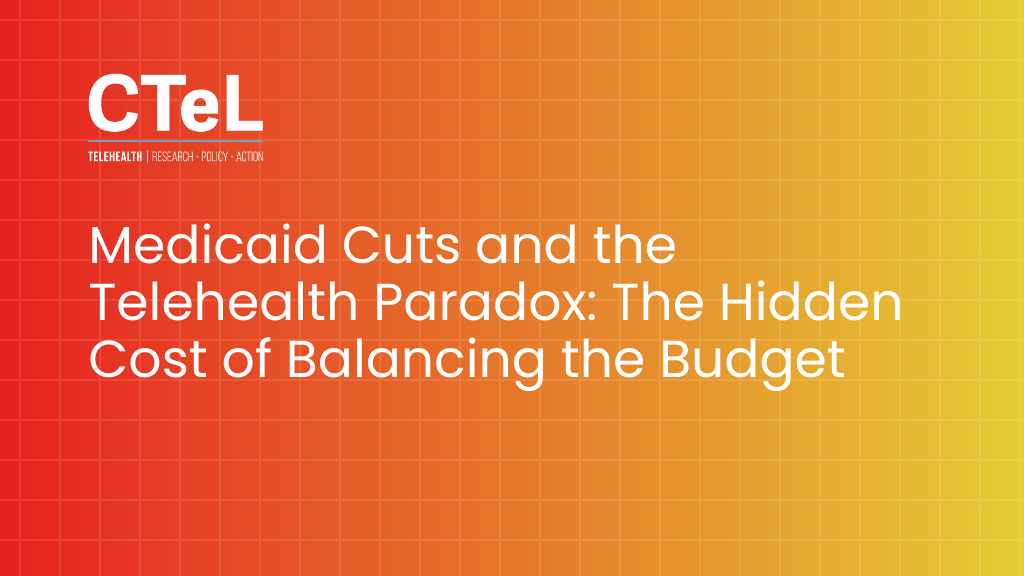
Medicaid Cuts and the Telehealth Paradox: The Hidden Cost of Balancing the Budget
The latest analysis from the Congressional Budget Office (CBO) exposes the stark reality behind proposed Medicaid cuts being pushed by Republican lawmakers. These cuts, aimed at offsetting the $4.5 trillion cost of extending Trump-era tax cuts (Weixel, 2025), would not only disrupt healthcare access for millions of low-income Americans, but they also jeopardize the future of telehealth—a vital service that has transformed care delivery, particularly for Medicaid recipients.

The “Richardson Waiver” Explained: Policy Implications for 2025 and Beyond
On March 3rd, 2025, Health and Human Services (HHS) Secretary Robert F. Kennedy Jr. published a policy statement directing the agency to no longer require standard federal regulatory rulemaking procedures for matters “relating to agency management or personnel or to public property, loans, grants, benefits, or contracts.” Notably, this gives the agency opportunity to forego issuing public comment opportunities for certain administrative actions.

The Telehealth Expiration Deadline: A Multi-Expert Analysis on Its Policy and Industry Impact
As the expiration deadline for telehealth flexibilities approaches, stakeholders across the healthcare landscape are grappling with critical questions: What happens next? How will regulatory shifts affect innovation, care delivery, and industry economics?
To answer these questions, we examine the issue through the lenses of five world-class experts from different fields—health policy, economics, technology, bioethics, and clinical care—offering insights that go beyond a single viewpoint.
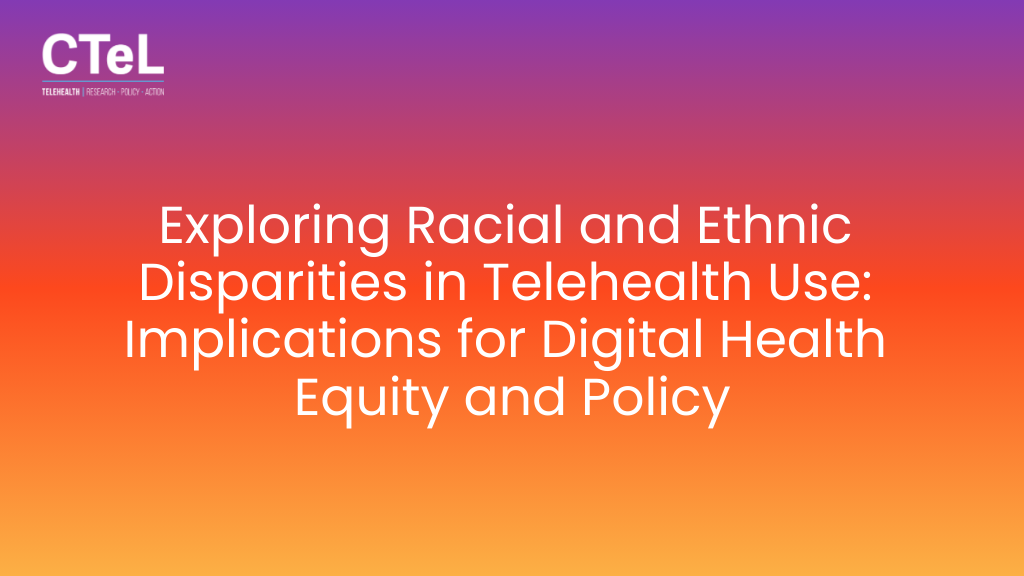
Exploring Racial and Ethnic Disparities in Telehealth Use: Implications for Digital Health Equity and Policy
The COVID-19 pandemic sparked a rapid transformation in healthcare delivery, accelerating the adoption of telehealth across the United States. While telehealth offered a lifeline to many patients during periods of restricted in-person care, concerns have emerged around equitable access and whether existing racial and ethnic disparities in healthcare have been exacerbated or alleviated by this digital shift.
A new study published in npj Digital Medicine (Fang et al., 2025) examines racial and ethnic disparities in telehealth utilization among Medicare beneficiaries. This large-scale analysis offers important insights for telehealth providers, digital health leaders, policymakers, and health equity advocates as they strive to design more inclusive and accessible digital health ecosystems.
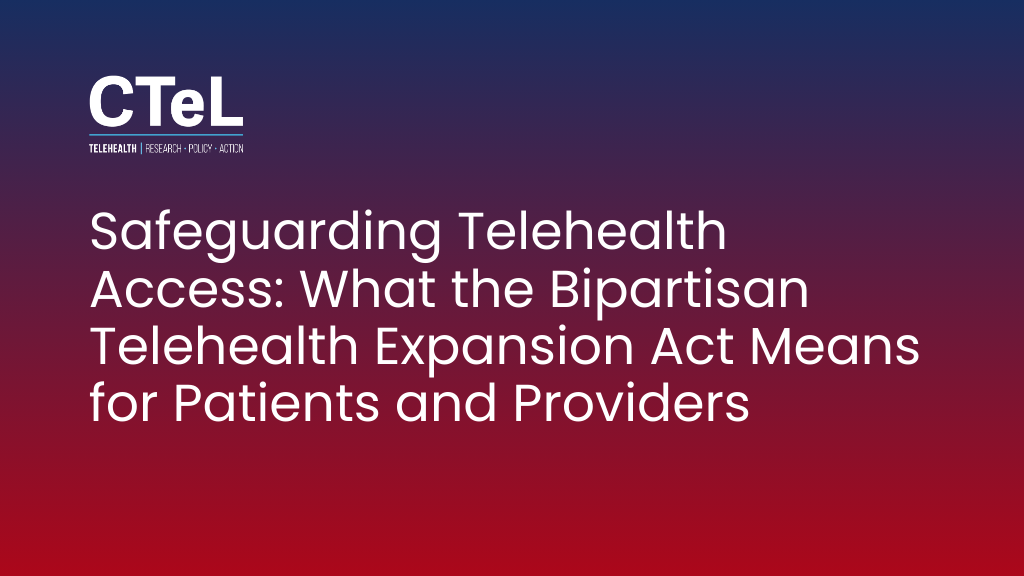
Safeguarding Telehealth Access: What the Bipartisan Telehealth Expansion Act of 2025 Means for Patients and Providers
Senator Steve Daines has introduced the "Telehealth Expansion Act of 2025," aiming to permanently allow High Deductible Health Plans (HDHPs) to cover telehealth services without requiring patients to meet their deductibles first. This change would amend the Internal Revenue Code of 1986, specifically modifying Section 223(c)(2) to ensure that HDHPs can offer first-dollar coverage for telehealth and remote care services without losing their status. The bill is set to take effect for plan years beginning after December 31, 2024.
This legislative move seeks to build upon temporary measures enacted during the COVID-19 pandemic, which allowed HDHPs to provide telehealth services without cost-sharing. By making this provision permanent, the bill aims to enhance access to remote healthcare services, offering patients more flexibility and potentially reducing overall healthcare costs.
The integration of telehealth services into standard healthcare offerings has been widely regarded as a positive development, especially in increasing access to care for individuals in rural or underserved areas. The "Telehealth Expansion Act of 2025" represents a significant step toward solidifying telehealth's role in the healthcare system, ensuring that patients with HDHPs can continue to benefit from remote care without financial barriers.
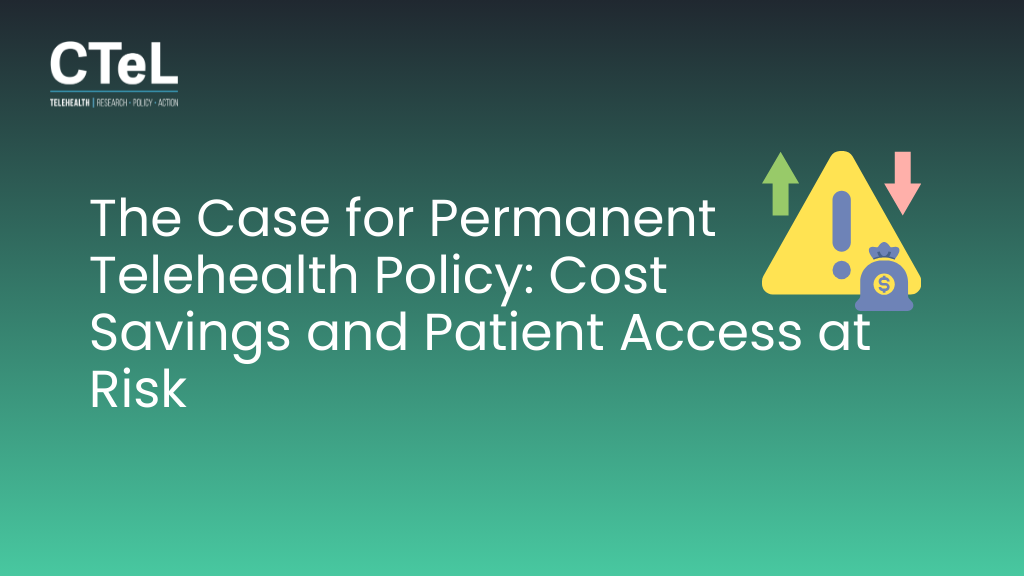
The Case for Permanent Telehealth Policy: Cost Savings and Patient Access at Risk
Telehealth has revolutionized healthcare delivery, demonstrating substantial cost savings and improving patient access. However, with telehealth waivers set to expire on March 31, the future of these critical services remains uncertain. Policymakers must act now to ensure telehealth remains a viable and permanent option in our healthcare system.

CTeL and URAC Partner to Develop AI Accreditation for Healthcare
As artificial intelligence (AI) transforms the healthcare landscape, ensuring safety, transparency, and ethical use of AI-driven solutions has become a top priority. Recognizing the urgent need for oversight, URAC, a leader in healthcare accreditation, has launched an initiative to develop the nation’s first Health Care AI Accreditation Program—with CTeL as a key strategic partner.
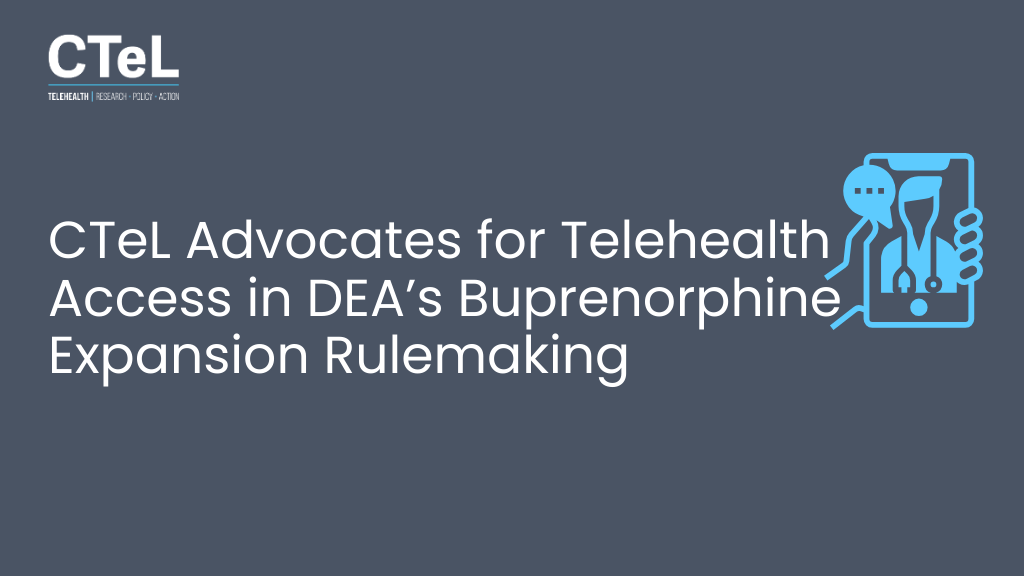
CTeL Advocates for Telehealth Access in DEA’s Buprenorphine Expansion Rulemaking
The Center for Telehealth and e-Health Law (CTeL) has officially submitted its comment letter to the Drug Enforcement Administration (DEA) in response to Docket No. DEA-948 - Expansion of Buprenorphine Treatment via Telemedicine Encounter and Continuity of Care via Telemedicine for Veterans Affairs Patients. This rule represents a pivotal shift in how telemedicine can be leveraged to address opioid use disorder (OUD) treatment, and CTeL is committed to ensuring that telehealth remains an accessible and effective tool for patients and providers.
Subscribe to the Telehealth Scoop!
Get the latest telehealth policy news you need to know, right to your inbox. Stay up-to-date on all the latest CTeL happenings, events, actions, and more!

